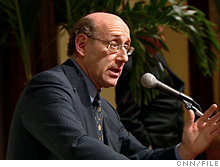Pay czar: I don't want more authority
Kenneth Feinberg tells lawmakers that reviewing pay practices at other TARP recipients would be "micromanaging."
 |
| Pay czar Kenneth Feinberg told lawmakers he does not want the authority to review compensation at more TARP recipients. |
NEW YORK (CNNMoney.com) -- Washington's so-called "pay czar" Kenneth Feinberg cautioned lawmakers against extending his authority to the hundreds of other companies that accepted government bailout money.
Speaking before the House Committee on Oversight and Government Reform Wednesday, Feinberg said his recent review of executive pay packages at the seven biggest bailout firms was "justified" given the government's massive stake in these companies.
Appointed by President Obama in June, Feinberg has spent the past five months carefully reviewing pay practices at those companies in order to both protect American taxpayers' investment and position the firms to pay back bailout money as soon as possible.
Still, he indicated that intervening in how banks and other companies that accepted money under the Treasury Department's Troubled Asset Relief Program, or TARP, would amount to nothing more than "micromanaging."
"That is where my authority should end," Feinberg said, according a copy of his prepared remarks before lawmakers. "I do not believe it necessary or wise to broaden my jurisdiction or make my legal authority more pervasive."
That sentiment was echoed by some lawmakers Wednesday who expressed concerns by the government's unprecedented level of oversight into how workers in the private sector are paid.
"The successes of the past in America should not, in fact, be wiped away because of the sins of a few on Wall Street who perhaps, realizing that bulls and bears were both making money, decided to become pigs," said Rep. Darrell Issa, R-Calif., the ranking member for the committee.
Last week, the pay czar issued his first in what will be a series of rulings on compensation, ordering 50% pay cuts, on average, for 136 executives at AIG (AIG, Fortune 500), Citigroup (C, Fortune 500), Bank of America (BAC, Fortune 500), General Motors, its former finance arm GMAC, as well as Chrysler and Chrysler Financial.
Feinberg now turns to the pay plans for the next 75 most-highly paid employees at each firm. He also will need to review pay plans for 2010 for all seven companies.
Last week's ruling only applies to compensation during the months of November and December but will serve as a base for determining how these executive are paid next year.
Feinberg warned Wednesday that issues like "grandfathered" retention contracts and other guaranteed forms of compensation could be particularly thorny issue in the months ahead.
"There will undoubtedly be new compensation issues which will confront us in 2010," he said.
He also faces the tough task of sorting through some $198 million in retention payments owed to workers in AIG's Financial Products division, the unit that led to that company's near collapse.
Feinberg said Wednesday that this issue remained a "top priority" for him and that he hoped to resolve it through negotiations with AIG in the coming months.
There are also signs that Feinberg's ruling is reviving the debate over whether lawmakers need to implement their own legislative constraints on pay.
One key proposal, which has the support of President Obama, would give shareholders at public companies a so-called "say on pay" for senior management by providing them a non-binding vote on executive pay packages.
Feinberg, a long-time Washington attorney who was thrust into the public spotlight earlier this decade after overseeing compensation payments to September 11 victims, said Wednesday the issue was "worthy of consideration" by lawmakers.
One key hope, however, was that other companies on Wall Street and across corporate America, would use his pay ruling as a model for how they reward employees going forward.
"Hopefully the model that is created in my report will trickle and expand beyond these seven companies," he said. ![]()


